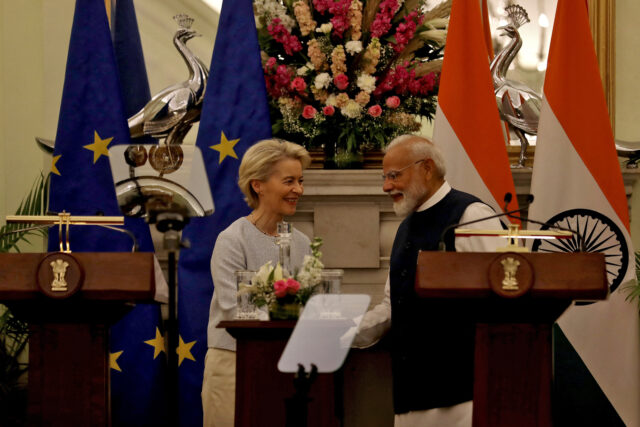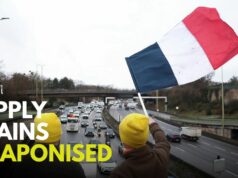
Amid assessing the response of Europe and the international community to the Pahalgam attacks on April 22, and the subsequent retaliatory Operation Sindoor launched by India on May 7, the false equivalence of the West remains problematic.
Although India’s approach earned strong diplomatic backing, the international response was marked by a delicate balance between support for India’s right to self-defence, and a broader call for regional restraint. This habitual balancing act, however, betrays a fundamental unwillingness to confront the reality of asymmetric aggression, and exposes the West’s continued discomfort in calling out Pakistan’s role as a state sponsor of terror.
European Union’s Calculated Neutrality
In this context, the European Union, along with most European countries adopted a position of neutrality, urging both sides to engage in dialogue.
In a statement it said, “It is vital that India and Pakistan live up to their obligations under international law and take all measures possible to protect civilian lives. The EU is committed to work with all parties to de-escalate the situation.”
Following separate phone conversations with India’s External Affairs Minister S. Jaishankar and Pakistan’s Deputy Prime Minister Ishaq Dar, EU High Representative for Foreign Affairs Kaja Kallas said “I urge both sides to show restraint and pursue dialogue to ease the situation. Escalation helps no one.”
This even-handed and evasive diplomatic posture placed India and Pakistan at par, reflecting a persistent international tendency to de-escalate tensions in South Asia by promoting regional stability, exemplifying the Western blind eye on South Asian security dynamics.
Not only has the EU not adequately addressed Pakistan’s role in cross-border terrorism, they have also showcased double standards when it comes to EU’s approach to global conflicts. What has come to the forefront has been nothing less than a troubling pattern of selective outrage and strategic inconsistency, with their foreign policy appearing to be guided less by objective assessments of aggression, and more by geopolitical convenience.
Despite overwhelming evidence of asymmetric warfare targeting civilians, the EU continues to adopt a ‘both-sides’ stance that equates the victim with the aggressor. Hypocrisy is further highlighted by the EU’s reluctance to hold Pakistan accountable, even as it aggressively demonises Russia for actions that, crucially, have not been directed at the EU itself.
Such selective moral posturing not only weakens the EU’s credibility as a principled actor on the global stage, but it also raises questions on the reasons for such hesitation.
Historical Roots of Western Equivalence
This tendency of the West, particularly Europe, to equate India with Pakistan, despite stark differences in their conduct, is not new. It is deeply rooted in a Cold War-era mindset that continues to shape Western strategic thinking even today.
For decades, Pakistan was a valued partner in the Western security architecture, including its role in the US-led CENTO and SEATO alliances. Given its strategically significant geography bordering Iran, Afghanistan, and China, it proved to be a convenient ally for the West, particularly during the Soviet invasion of Afghanistan.
In contrast, India’s position as a leader of the Non-Aligned Movement meant it was often viewed with suspicion by Western capitals.
This legacy has left a lasting imprint on how Europe interprets developments in South Asia. Even today, despite India’s emergence as a major economic power and responsible nuclear actor with a No First Use Policy, Western diplomacy often reverts to an outdated script, one that sees both India and Pakistan as equally unstable nuclear powers in perpetual tension.
Nowhere is this contradiction more apparent than in Europe’s near-silence in response to explicit nuclear threats made by Pakistani leaders. Over the years, Pakistani politicians and military figures have repeatedly invoked the nuclear card as a deterrent and, at times, as a veiled threat to internationalize bilateral disputes.
Playing the nuclear card as a strategic bluff, Pakistani Foreign Secretary Shamshad Ahmad’s 1999 warning during the Kargil War that Pakistan “will not hesitate to use any weapon in our arsenal,” was a loud declaration of them not adhering to NFU.
Similarly, President Pervez Musharraf’s 2002 assertion that its nuclear capability was “not for show,” and Prime Minister Imran Khan’s 2019 UN speech cautioning of a possible nuclear war following India’s revocation of Article 370, is a rhetoric that has been used time and again to deflect global scrutiny from Pakistan’s support for cross-border terrorism.
Over the course of military escalation between the two neighbours in May 2025, Pakistani officials and military-linked analysts reverted to familiar escalation narratives, warning of regional instability and invoking the language of deterrence.
As a result, it remains evident that the nuclear undertone remains implicit in Pakistan’s strategic discourse, consistently being used to deter international accountability and pressure India into restraint.
The issue is not merely diplomatic optics; it is one of principle. India has consistently adhered to norms of responsible state behaviour, be it its no-first-use nuclear doctrine, its measured response to provocation, or its commitment to democratic governance.
Pakistan, on the other hand, has often (and continues) to shield terror proxies, employed hybrid warfare, and used nuclear brinkmanship as cover for cross-border aggression. The refusal of the West to distinguish between a democratic state and a state that harbours terror networks is also evident with in their selective moral outrage.
The hypocrisy is further exposed at the United Nations, where even the designation of known terrorists is routinely blocked or delayed, not on grounds of evidence, but due to geopolitical alignments.
Despite credible proof and global consensus, individuals involved in attacks on Indian soil have repeatedly evaded international sanction as either permanent member of the Security Council chooses to obstruct the process. This leads to ambiguous undermining of the credibility of the very norms that the West seeks to uphold at the world stage.
Rethinking Strategic Balance
In the pursuit of stability, neutrality may seem like the safest course. But when neutrality repeatedly blurs the line between the aggressor and the aggrieved, it inches more towards indifference rather than neutral diplomacy.
Europe, being a normative power, with its historical commitment to human rights, international law, and principled foreign policy, must recognise that treating India and Pakistan as equals in moments of terror completely misreads the regional security architecture in the South Asian theatre.
A stronger, more credible European engagement in the region does not have to lie in choosing sides, but should also not be a refusal to acknowledge facts through false equivalence. If the EU truly seeks to be a global actor of consequence, it must move beyond formulaic calls for restraint and demonstrate the moral clarity to distinguish between those who uphold the rules-based order and those who routinely violate it, drawing a clear line between neutrality and neglect.
Dr. Shreya Sinha is an Associate Fellow (Europe) at the Vivekananda International Foundation, New Delhi




